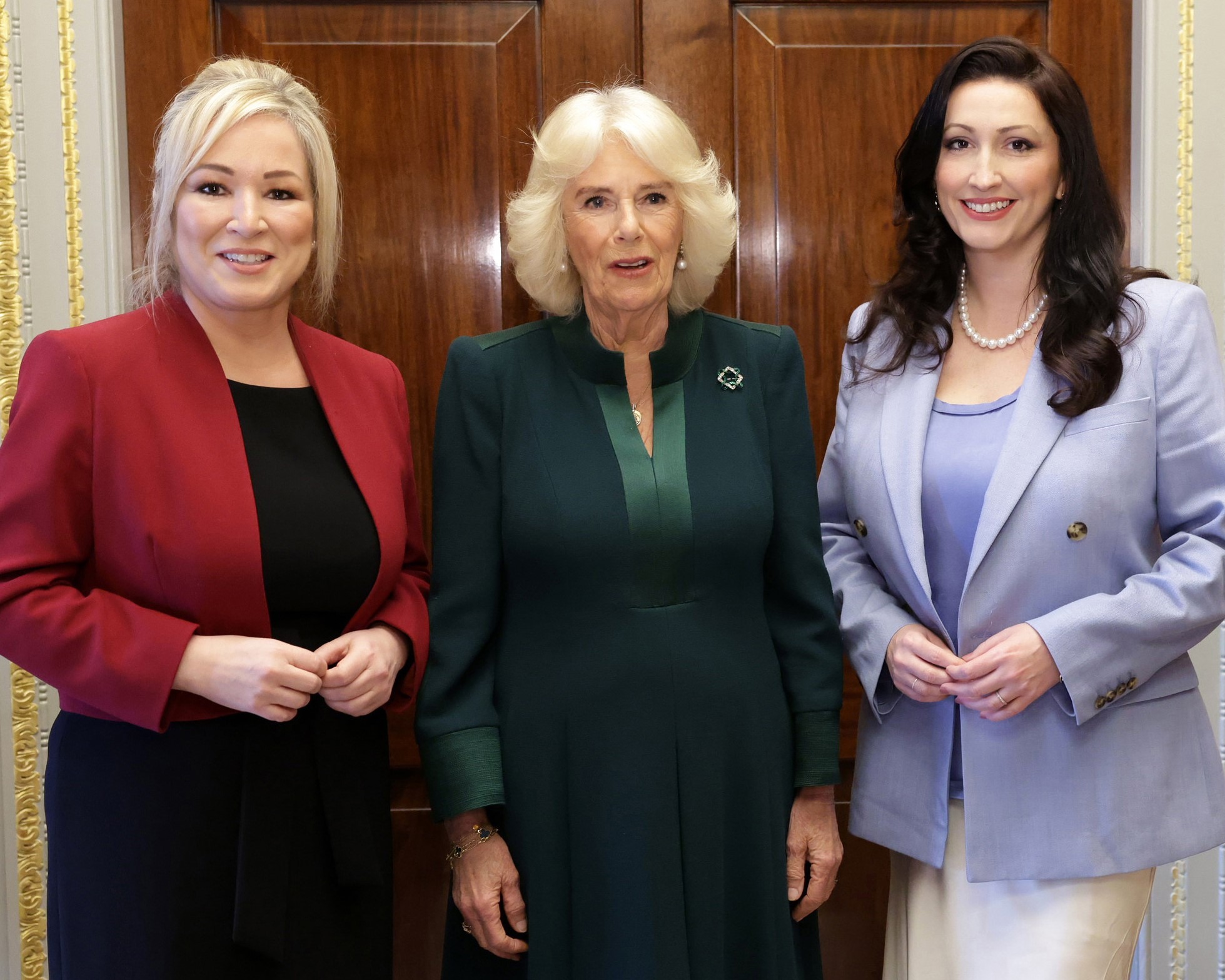Time was when the south was the home of predictable calm and the rumpus was north of the border.
On Thursday afternoon, Queen Camilla sat in the front row of seats in the throne room at Hillsborough Castle. Behind her, side by side were the two women fronting Northern Ireland’s power-sharing administration, Michelle O’Neill and Emma Little-Pengelly.
The occasion was a function called “Northern Ireland: Poets and Their Place”, curated by Pulitzer Prize-winning poet, author and writer Paul Muldoon, who was born in Portadown, Co Armagh. Muldoon’s many memorable poems include The Sightseers, an account of a family outing to see the Ballygawley roundabout and, during the journey, of his uncle Pat telling of being stopped by the B specials.
“They held a pistol so hard against his forehead
there was still the mark of an O when he got home.”
The programme arranged by Muldoon had An Lon Dubh Báite – the Drowned Blackbird by Seámus Dall Mac Cuarta (translated and read by Paul Muldoon); To the Potatoe by James Orr, read by Ian McElhinney; There is a Green Hill, by Cecil Frances Alexander, read by Frances Tomelty; Me an Me’ Da, by WF Marshall, read by Ian McElhinney; Carrickfergus, by Louis MacNeice, read by Ian McElhinney; Ulster Names, by John Hewitt, read by Francis Tomelty; and Bogland, by Seamus Heaney, read by Frances Tomelty.

Cathal Goan once described Muldoon’s subject, Seámus Dall Mac Cuarta (Blind Jimmy McCourt), as the symbol of changing times – enforced changes. The sounds and nuances of Irish, Ulster Scots and the subtleties of place, history, the local and the universal filled the room.
Then it was the turn of three poets, Sineád Morrissey, Raquel McKee and Michael Longley, to read their own works.
Morrissey, like Muldoon, was born in Portadown. She studied at Trinity College Dublin and is now a professor of creative writing at Newcastle University. She was Belfast’s inaugural city poet. She performed her work The Millihelen, which she says is “the amount of physical beauty required to launch a single ship”. The poem is about the launch of the Titanic.
Raquel McKee is a Jamaican-born poet, storyteller, actor and singer-songwriter who has made Northern Ireland her home.
The actress Lauren Bacall once said: “I am not a has-been, I am a will-be.” The 84-year-old Longley caused laughter when he quoted one of her less positive comments about ageing. He performed probably his most famous poem, Ceasefire, written in August 1994 as speculation was growing about the possibility of an IRA ceasefire.
It closes with the unforgettable lines:
“I get down on my knees and do what must be done
And kiss Achilles’ hand, the killer of my son.”
The Hillsborough event was part of the Queen’s Reading Room project. It was launched in 2021, during the Covid-19 pandemic, as a book club initiative by Camilla when she was the Duchess of Cornwall. Now a charity working to promote the power and benefits of reading, it has grown into a global online community.
The poetry event was held on March 21, the seventh anniversary of the death of Sinn Féin’s Martin McGuinness. During the 12 months he and then DUP leader Ian Paisley led the unlikely power-sharing partnership, they were known as “the chuckle brothers”. Portraits of McGuinness, the Ulster Unionist leader, David Trimble and the SDLP leader, John Hume, now hang on some of the walls of Hillsborough, the residence of the Northern Ireland secretary.
The smiling sisters
Less than two months into their role, jointly fronting the power-sharing administration, Michelle O’Neill and Emma Little-Pengelly are being called “the smiling sisters”.
Immediately after the Queen had departed for the airport, the pair held a news conference on the porch of Hillsborough Castle. They announced the go-ahead for a £300 million (€349.4 million) investment in a shared education campus outside Omagh, on the grounds of a former British Army base.
The Throne Room where the poetry event took place was the site of a news conference in October 2003 when retired Canadian General John De Chastelain announced that expected IRA weapons decommissioning had not taken place. The disappointment prompted David Trimble to withdraw his Ulster Unionist party from negotiations.
Hillsborough Castle, like so many places in Northern Ireland, saw many setbacks, interruptions and ruptures during the peace process.
Thursday’s event offered hope of better times.
As the guests were leaving, south of the border, Simon Harris was preparing for the official announcement that he would seek the Fine Gael leadership. The person he will replace, Leo Varadkar, was in Brussels, attending his last meeting of EU leaders in the role of Taoiseach.
Varadkar’s final formal outing may be attending the North South Ministerial Council in Armagh on April 8. Since 2016, only two such gatherings of the Dublin and Stormont governments have taken place. The last one was a video conference in July 2021.
Then Taoiseach Brian Cowen and his group of ministers had their final formal outing at an Armagh event in 2011. They came in a minibus. The economy was in meltdown and they couldn’t be seen arriving in a fleet of expensive cars.
Peter Robinson, then Northern Ireland’s first minister and DUP leader, came to Armagh in December 2015 as he prepared to exit public life. That was the day Enda Kenny presented him with two tickets for the Spurs-Arsenal North London derby.
So, there is precedent for a North-South event serving as the official end-point of a career. In Varadkar’s case, during what may be a day of mixed emotions, he will have the satisfaction of observing Northern Ireland in its most settled state since he became Taoiseach in 2017.


